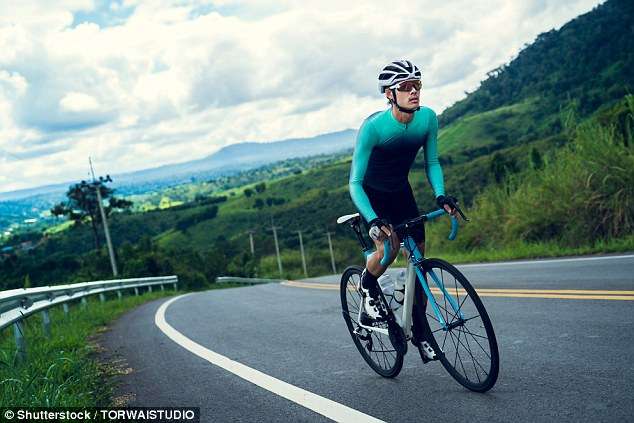But Mamils have the last laugh, as evidence shows they avoid the male menopause and age more slowly.
A study has found men up to the age of 79 have the testosterone levels of much younger men, and the muscle and body fat levels of men in their twenties if they are lifelong cyclists.
Those who can cycle 100km (62 miles) in under six and a half hours appear to avoid the 'male menopause' – the drop in testosterone blamed for fatigue, low libido and depression.
They have half the body fat of men their age who do not cycle, at 20 per cent rather than 30 per cent fat.
Better still, a British study found, their immune systems are stronger, which makes them less vulnerable to seasonal infections such as flu, norovirus and pneumonia.
Researchers at the University of Birmingham and King's College London have found signs of ageing thought to be inevitable can be avoided in men and women who are fit.
They compared 125 middle-aged to elderly amateur cyclists, who had cycled for an average of 26 years, with people of the same age who did not regularly exercise.
Professor Janet Lord, Director of the Institute of Inflammation and Ageing at the University of Birmingham, said: 'Hippocrates in 400 BC said that exercise is man's best medicine, but his message has been lost over time and we are an increasingly sedentary society.
'However, importantly, our findings debunk the assumption that ageing automatically makes us more frail.
'Our research means we now have strong evidence that encouraging people to commit to regular exercise throughout their lives is a viable solution to the problem that we are living longer but not healthier.'
The researchers recruited 125 amateur cyclists aged 55 to 79. The men had to be able to cycle 100km (62 miles) in under six and a half hours, while the women had to be able to cycle 60km (37 miles) in five and a half hours.
The cyclists were compared to 75 healthy people aged 57 to 80 and 55 healthy young adults aged 20 to 36.
The testosterone levels seen in male pensioners who cycled were the same as those in middle age, suggesting they had avoided the 'male menopause'.
Older people lose roughly two per cent of their muscle mass a year, meaning a third of their muscle is gone by the age of 70. But the muscle levels of older cyclists were the same as people in their twenties.
Cycling also wards off middle-aged spread, with female cyclists having roughly 28 per cent body fat compared to nearer 40 per cent for non-cyclists.
The most surprising finding came from the cyclists' immune systems, which did not appear to age either.
An organ called the thymus, which makes immune cells called T-cells, starts to shrink from the age of 20, but not in cyclists. This means middle-aged people who exercise will see the flu vaccine work better, are less likely to get infections and will be less unwell if they do.
The researchers say the benefits are likely to come from all forms of exercise.
Professor Stephen Harridge, director of the centre of Human & Aerospace Physiological Sciences at King's College London, said: 'The findings emphasise the fact that the cyclists do not exercise because they are healthy, but that they are healthy because they have been exercising for such a large proportion of their lives.
'Their bodies have been allowed to age optimally, free from the problems usually caused by inactivity. Remove the activity and their health would likely deteriorate.'
The findings are published in two papers in the journal Aging Cell.
The Daily Mail
More about: Cycling
















































